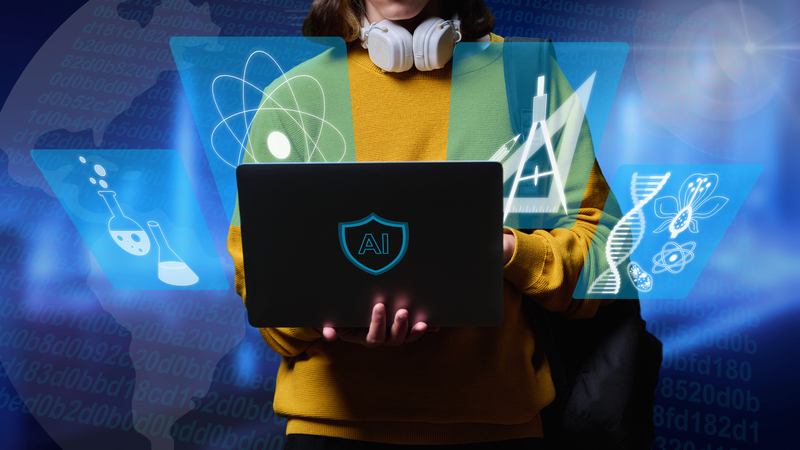Careers, Sponsored Editorial, Your Career
How A.I., Math, and Robotics Help Students Pursue High-Paying Tech Careers
Editorial Staff

The demand for skilled professionals in the tech industry shows no signs of a decline. Roles in artificial intelligence, robotics, and automation now dominate lists of high-paying careers. But landing these jobs requires more than theoretical knowledge. Students must learn to solve tangible problems, merging mathematical rigor with technical creativity. Modern education is rising to the challenge. It leverages A.I.-driven tools and robotic training to transform learners into agile thinkers ready for tomorrow’s workforce.
Among others, math and robotics are two subjects at school that can open doors to tech careers. Luckily, A.I. is making learning these subjects easier. It can teach technical skills while preparing students for a future in fast-paced industries.
A.I.-Driven Math Education: Bridging Theory and Application
A.I. revolutionizes how students engage with math. Unlike a traditional one-size-fits-all curriculum, A.I. tools analyze individual strengths and weaknesses. In turn, it allows personalization in math education. It recognizes the fact that not all learners are the same, and differences must be addressed to deliver effective and impactful classroom instruction.
Using an online math A.I. tool allows math education to keep up with the learner. Lessons and exercises are tailored to a user’s learning style and progress. For example, math problems can be more difficult when easier questions are answered quickly. Meanwhile, it can also flag areas where students struggle, adjusting the lessons to address knowledge gaps.
Today’s A.I. platforms prioritize application over memorization. These tools can be used to model real-world scenarios and visualize abstract concepts. Aside from personalized learning, A.I. also allows real-time feedback and adaptive assessments. Plus, math lessons no longer have to be boring. Incorporating gamification into math education makes it more interactive and educational.
Developing Necessary Skills for Tech Careers
Math fluency, with the help of A.I., helps in developing core competencies for various tech roles, including the following:
- Algorithmic Thinking: A.I. platforms train students to break down complex problems into logical steps. They will develop critical thinking as they navigate not just the output, but also the process of how such was determined.
- Statistical Analysis: Modern tools can simulate real-world datasets. They can teach students to interpret trends, calculate probabilities, and validate hypotheses. Students can use regression analysis to predict equipment failures in smart factories.
- Optimization Techniques: A.I. can teach resource allocation strategies, such as minimizing energy consumption in smart electricity grids or maximizing throughput in logistics. These skills are critical for automation specialists in tech-driven industries.
- Collaborative Technical Communication: Math education goes beyond solving numerical formulas. It also includes articulating solutions, collaborative debugging, and presenting data visually. AI tools can help develop such soft skills.
Robotics Training: Building Technical Creativity
Aside from math, robotics is another school subject that can prepare students for a rewarding career in tech. Robotic programs push students beyond abstract concepts. Through such a curriculum, learners build, test, and refine physical systems. Learners grapple with real-life variables like friction, latency, and environmental noise in different projects they will complete. This iterative process can prepare them to be skilled robotic engineers.
A.I. and robotics converge in autonomous technologies. Self-driving cars, for instance, rely on A.I. algorithms to process sensor data. Robotics governs mechanical responses like steering and braking. Students who master this synergy can develop skills like real-time decision-making and predictive maintenance.
Benefits of A.I. Integration
Building robots is a complicated task, but it becomes easier when A.I. is used in the classroom. Using A.I. doesn’t just improve technical skills. It also prepares students for the interconnected challenges that may confront them once they land a tech job.
- Programming Adaptive Systems: Students train robots using machine learning algorithms so they can self-correct and adapt. An example of this would be training drones for an optimal flight path based on wind patterns or obstacles.
- Mastery of Data Analytics: A.I. platforms help students make sense of vast information, which can help robots think like humans. Learners can practice synthesizing these inputs to create the best possible outputs.
- Ethical Deployment: Bias, safety, and transparency are important issues to address in robotics education. AI tools can help foster better decision-making, teaching students a skill they can implement even outside their classes.
Pathways to Promising Careers
Skills in A.I., mathematics, and robotics open doors to jobs where technology meets real-world impact. The possibilities are endless, including those briefly discussed below.
Data Scientists
Data scientists are the storytellers of the digital age. They sift through mountains of raw data, which include sales figures, social media posts, and sensor readings. These are maximized to uncover patterns that drive smarter decisions. Statistical models and machine learning are used to answer the most important questions.
But it’s not all about spreadsheets and equations. They can also train an A.I. tool to scan thousands of product reviews to spot emerging trends before competitors do. They can also use robotics-generated data from traffic cameras to redesign bus routes and make commutes more efficient.
These professionals can thrive in fast-paced industries like healthcare, where predicting disease outbreaks can save lives. Or they can also work in finance, where spotting market shifts early can translate to huge profits.
Software Engineer
Software engineers specializing in A.I. and robotics can build invisible frameworks that make machines think. They write code that lets drones dodge obstacles, helps robots sort packages, or enables smart speakers to recognize human voice. Strong math skills let them tweak algorithms for speed. Robotics experience teaches them how codes interact with physical components.
From autonomous logistics to A.I.-driven healthcare, software engineers have a wide career prospects. They can program drones to map wildlife zones or embed computer vision into security cameras.
Robotics Engineer
Recognized as modern-day inventors, robotic engineers combine mechanics, electronics, and code to create machines that move, sense, and adapt. They can design a robotic arm that assembles microchips with nanometer precision or design agricultural drones that monitor crop health. Beyond knowledge in robotics, they also need math acumen. From calculating the exact force needed to lift an object to simulating how robotic joints will wear over time, knowledge of numbers and formulas is crucial.
To make these robots work, engineers also have to tap into A.I.. Such technology can make automation seamless. It’s A.I. that converts rigid machines into innovative problem solvers. As such, they can do more than just follow instructions. They can be more independent, demonstrating the limits of what technology can achieve.
Cybersecurity Specialist
The guardians of the digital world hunt vulnerabilities in networks, devices, and systems before a hack can happen. Their skills will help them design programs to implement next-level security and address evolving threats in a digital era.
While it’s a given that AI is a necessary skill to excel in this field, math and robotics are equally crucial. Math skills are essential for crafting encryption protocols that protect sensitive data. Robotics expertise comes into play when safeguarding interconnected IoT ecosystems. Deep technical fluency in these fields can help in the development of effective algorithms against emerging threats.
Wrapping Up
The future belongs to those who can merge technical mastery with creative problem-solving. In-depth knowledge and skills in A.I., math, and robotics are necessary for those who want to build a fruitful tech career. Students equipped with these skills will adapt to technological evolution and drive solutions that can solve modern-day problems.
SEE ALSO: Balancing Study Time and Self-Care















-225x300.jpg)